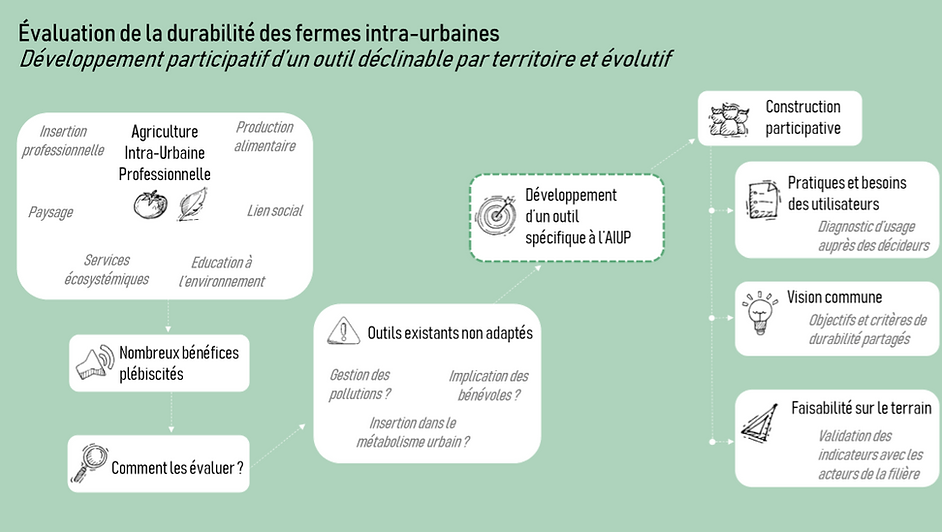Assessing the sustainability of professional intra-urban farms
Participatory development of a tool that can be adapted by territory and is scalable
context
Today 55% of the world's population lives in urban areas, and by 2030, the emergence of 43 megacities with more than 10 million inhabitants is expected in the world. In parallel with this growing demand for food products for urban areas, the demand for transparency vis-à-vis the origin and quality of food products on the part of urban consumers is growing.
One of the major challenges of the coming decades is therefore to ensure sustainable urban development, guaranteeing strong links between centers of consumption of food products and production areas.
Professional intra-urban agriculture
Professional intra-urban agriculture - AIUP - is one of the responses to this challenge by setting up multifunctional farms within urban areas, making it possible both to produce food close to consumers, but also to improve the living environment of urban dwellers.
In 2016, the Institute for Planning and Urbanism of Ile-de-France proposed a typology of forms of urban agriculture. It includes peri-urban farms, collective gardens, individual urban agriculture, urban micro-farms and greenhouses and indoor systems.
Within the framework of this thesis, peri-urban farms as well as non-professional projects represented by collective gardens and individual urban agriculture will be excluded. Only urban micro-farms, urban greenhouses and indoor systems will be studied.
Sustainability
Faced with the emergence of these new projects, and the willingness of communities and donors to support these initiatives, the need to assess these projects and their social, economic and environmental benefits has become essential.
Many tools to assess the sustainability of rural farms exist, but are not or poorly adapted to the specificities of the AIUP, which is developing in many forms ranging from high-tech projects with high productivity to low-tech projects. with a strong social dimension.

Objectives of the thesis
Develop a sustainability assessment tool for AIUP projects, applicable in France, for...
communities
public or private donors
other actors providing land, financing, or technical expertise
Methodology
Aparticipatory approachis adopted, aiming to involve the stakeholders of the French urban agriculture sector during the different stages of the construction of the tool. Sustainability is a subjective notion that translates the values and objectives specific to the actors who define it. Therefore, for the tool to embody a vision of sustainability shared by the players in the sector, and for it to meet their needs in terms of evaluation, it is essential to involve them in the process of building the 'tool.
Main issues
-
Need forassess these projects and their social, economic and environmental benefits,due to the emergence of these new projects, and the willingness of local authorities and donors to support these initiatives
-
Adapt existing toolssustainability assessmentrural farmsvery polymorphic AIUP projects (ranging from high-tech projects with high productivity to low-tech projects with a strong social dimension)
-
Find the right criteria and indicators responding to the specificities of agricultural production in urban areas(such as pollution management or the involvement of volunteer work) and presenting threshold values adapted to the urban context

